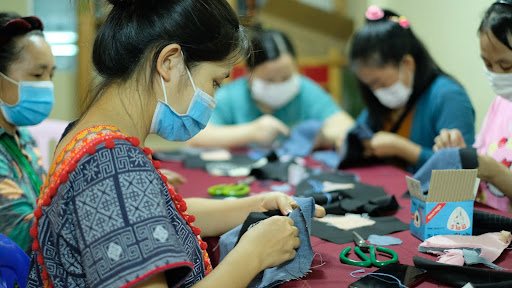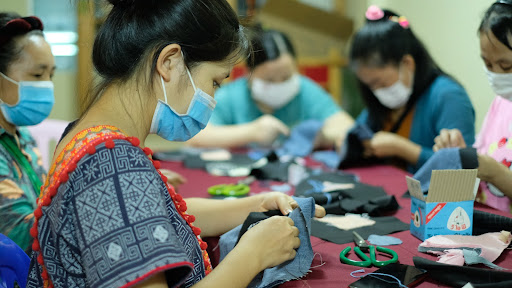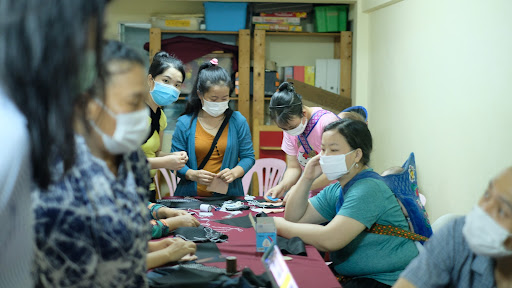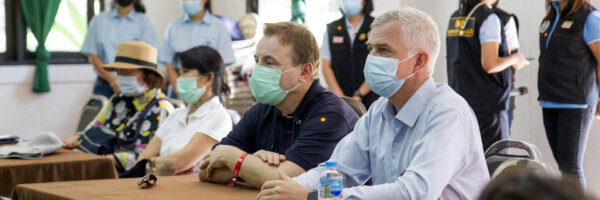
REVIV SHOP
SLOW FASHION IS A RADICAL ACT:
REVIV SHOP, an online clothes repair provider.

I was looking for someone who could help me upcycle a few old jeans which I am not using.I sent a message to a few people who are involved in the slow fashion movement in Bangkok and someone recommended REVIVSHOP to me. I checked their website and I found their business model very interesting. I am always on the lookout for people and brands who are committed to creating a sustainable future. As a writer, I have had the opportunity to meet many such people in Thailand and what really drives me to these stories is that it takes immense goodwill and courage to create such a business model when there is no political will or support towards creating a circular economy.

I met the co-founders of REVIVSHOP in a cafe in Ari which is one of Bangkok’s most hipster and artistic neighbourhoods. The vibe and energy there was very relaxed,it is an area which is still relatively undiscovered by expats in Bangkok and travellers. As we introduced ourselves, the first question I asked them was about the mission behind their business. They mentioned that their mission is to be an online provider for clothes repair and alteration. They are committed to creating a fashion industry that is local, inclusive and mindful of nature. They do this by educating people about the importance of reusing clothes , supporting the informal labor community and empowering the existing fast fast fashion labor market towards the slow fashion business. They want to focus on all the areas which are important to transition towards a slow fashion system. There is currently excess production by fast fashion brands which is polluting the planet and exploiting labor, REVIVSHOP is a business model which aims to change that by valuing people and planet over profit.

A question I get asked often is “Why is slow fashion products and services so expensive?”. The answer lies in why fast fashion is so cheap. They exploit labor to keep prices low so a product which is cheap in price did come at a heavy cost for someone else and the environment. There were so many reports about fast fashion brands exploiting Uyghur camps in China last year, when a business model is driven only by profit and has no accountability or morality, it is doomed to be messy. There are also shocking reports of wealth inequality, these companies who are exploiting labor are showing high profits . The top management salaries get higher and higher while the people at the bottom of the supply chain do not receive a basic living wage.

The fast fashion business model is fundamentally flawed, it is based on over production and over consumption of clothes we don’t need. It is one of the most polluting industries on the planet which exploits land and labor exponentially. This is extremely dangerous as threats of climate change become more and more serious.

A lot of fast fashion brands claim to be using sustainable fabrics and recycling but that has been reported as greenwashing by many reputable news channels and publications. Recently, Germany’s leading channel DW did a story on what actually happens to all the clothes H&M and other fast fashion brands claim to be recycling. Most of the clothes consumers give back for recycling cannot be recycled because of the low quality poly-blends used to make them. Fast fashion is so heavily dependent on fossil fuel based fibres which are disastrous from production to disposal. The reality of recycling claims by these brands is that it is another way to make customers shop more because everytime someone takes their old clothes to donate to the recycling bin, they are given a discount coupon to shop more. Most people are completely unaware that their old clothes don’t get recycled and end up in a poorer country where it is mostly cut into scraps and burnt. This is an environmental disaster, the burning emits greenhouse gases which are dangerous and it lowers the air quality. The consumer assumes that their clothes can be recycled because that is what they are told by these fast fashion brands. It is easy for these brands to greenwash consumers because there are no strict regulations for fast fashion labels.

A lot of critics argue that fast fashion can never be sustainable unless they change their fundamental business model of over producing. The biggest issue with the fast fashion business model is that it absolutely lacks accountability and transparency and there is a desperate need for newer business models like REVIVSHOP which provide more sustainable fashion alternatives.
Are you ready to REVIVE, SWAP, THRIFT, REUSE and REPAIR old clothes instead of constantly buying fast fashion?
For more details on the services provided by REVIVSHOP, log onto www.revivshop.com.



